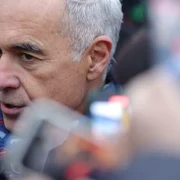The post-American NATO
0In the March/April issue of the global edition of the Foreign Policy, Andrew Bacevich, professor of international relations at Boston University, argued for the retreat of the United States from NATO. His article “Let Europe be Europe-Why the US must withdraw from NATO” could easily become the Manifesto or the flag ship of a larger intellectual trend that is gradually gaining traction in some circles of the U.S. foreign policy community: the
“Europe is too thickly planted with kingdoms to be long at peace”-wrote Thomas Paine some two centuries ago. Since then many things have changed. Speaking in the National Defense University Secretary Gates expressed the opposite fear. In his view “demilitarization of Europe-where large swaths of the general public and political class are averse to military force and the risks going with it-has gone from a blessing in the 20th century to an impediment to achieving real security and lasting peace in the 21st”. In short Europe is planted with too many pacifist democracies to sustain a necessary war.
This is the context in which the US started to re-conceptualize its relations with Europe. The shift of power, the impact of the global economic crisis/causing fear of overstretch/ and Washington’s bitterness about Europe’s unwillingness or inability to assist Americans in Afghanistan made many ready to ask tough questions and to come with radical answers. American diplomats will never say it but in reality the US is not an European power any more. It is an illusion that the US’s involvement in Europe can be similar in its scale and content to the role the Washington played in the days of the Cold war or in the last twenty years. Barack Obama is the most European minded but at the same time the first post-European American President. In the words of one of his closest advisor he thinking is along the South-North and not along the East-West divide. For sure Europe will preserve its strategic importance for the Americans but it cannot preserve its centrality. US’s strategic thinking is undergoing profound change. Nothing is unthinkable, nothing is impossible.
In this sense Andrew Bacevich’s piece “Why the US should withdraw from NATO” is something more than an useful provocation, it is plausible yet unlikely strategy. His arguments are also not the usual anti-NATO arguments coming from unilateralists who believe that NATO is nothing else than an instrument for constraining American power or the arguments of Russia friendly realists who believe that Europe is as secure as it can be and that NATO should be buried in the name of better relations with Russia.
Bacevich’s argument are very different. He recognizes the existence of Russian threat in Europe but in his judgment Europeans have the capabilities to deal with this threat. In his thinking America’s withdrawal from NATO will force Europe to come with more unity of purpose and action when it comes to its common defense. The present status quo of the US-centered security arrangement contributes to the existing mistrust between old Europe and new Europe and makes it difficult for the EU to realize its potential as a security actor.
The bad
So, Bacevich’s central proposition is that Washington should scrap its ambitions for Global NATO and instead of it push the EU to play more central role in the defense of European continent. Can the EU do it?
Yes, on the level of capabilities. Russia is a formidable power but it is not Soviet Union. The combined military spending of the EU member states are much higher than those of Moscow. British and French armed forces are far better equipped and far better trained than the Russians. It is also true that “Eastern threat” to Europe should not be defined primarily in military terms and in this sense the EU is better prepared than NATO to deal with issues like energy security for example? But while Bacevich’s judgment is more precise than the alarmist estimation coming from some parts of Eastern Europe he in my view underestimates some of the risks associated with radical American withdrawal from Europe. America’s withdrawal can result not so much in strengthening the security role and defense capabilities of the EU but in re-nationalization of the foreign and security policy. The sad reality today is that when it comes to Russia Berlin and Paris prefer bilateral approach with Moscow while East Europeans rely disproportionally in its relations with the US. Secondly, you should not be Rumsfeld to believe that weakness is an invitation for aggression, so the US’s radical withdrawal from Europe can change radically Russia’s strategy to the continent. US’s withdrawal will not also make easier EU-Turkey dialogue in the field of Europe’s security. At the moment Turkey is more European in its institutions and politics than in any other moment since World War II but her foreign policy is in a diverging course with its European allies. Add to all this the countless logistical problems that the US’s withdrawal will cause and you will realize that Bacevich’s argument has its dangerous side.
The good
But where Andrew Bacevich in my view is totally right is that US’s relations with its European allies should shift back to Europe. It is more realistic to think about a soft version of Bacevich’s strategy. Namely, in its new strategic concept NATO should be re-defined as European alliance and its activities should be limited to Europe. If some of NATO allies want to participate in America’s operations out of the area it should be through coalitions of the willing. Secondly, NATO should be re-organized as a two pillar alliance between US and EU. And thirdly, the EU should take the major responsibility for the defense of Europe. What remains for the US is the role of Europe’s offshore security protector. But Washington should play this role from inside not from outside of NATO. Because at the end of the day Europe is not as important to the US as it was some decades ago but it is important enough. It should not be forgotten that American investments only in the Republic of Ireland are twice as high as America’s investment in China and India combined.
Ivan Krastev is president of Centre for Liberal Strategies, in Sofia, and editor in chief of FP Bulgaria.




















































